Entertainment
The Post-Post-#MeToo Era: Johnny Depp & Amber Heard’s TikTok Trial
Published
2 years agoon
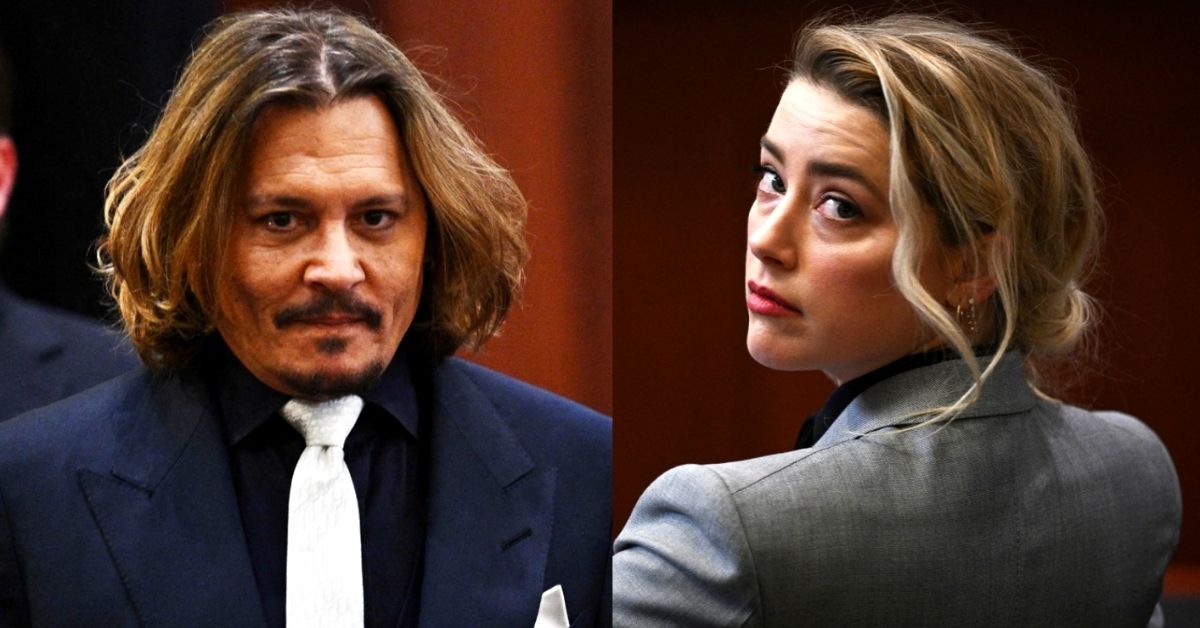
Recently, I spoke to a friend about Don’t Look Up and The Bubble, two star-studded COVID comedies that are, among other things, shockingly unfunny.
He brought up Bombshell, a 2019 movie about the exposure of Roger Ailes’ misconduct at Fox News. I, having seen it in theaters, considered it another example of a lukewarm, too-soon satire. He, who streamed it in 2021, found it a well-done reflection on the #MeToo movement.
This speaks to how brief the “#MeToo era” turned out to be. What was still too close for comfort in 2019 reads like a historical text today. By the time the pandemic came around, several figures whose time was supposedly “up” had already come back with a vengeance.
Today, we’re not even in the post-#MeToo world. We’re post-post-#MeToo, where the symbols and language of the movement are equally canonized (and perhaps weaponized) by the movement’s kin and its backlash.
Anyway, Amber Heard and Johnny Depp are in the news.
Depp v. Heard: a timeline
I intend to cover the history of this legal battle as impartially as I can. This article is not a condemnation of Amber Heard or Johnny Depp, just a reflection on the trial’s cultural significance.
With that being said, the progression and increased media coverage of their split is a fascinating case study. While Depp was never especially seen as a #MeToo mark, the movement against abuse in Hollywood is inseparable from the context of this story.
2016: Amber Heard files for divorce
In late May, sandwiched between the death of Depp’s mother and the release of Alice Through the Looking Glass, Amber Heard filed for divorce from the actor. Depp’s public image had already soured from a string of flops, and the pair’s 18-month romance was already full of odd chapters.
Days later, Heard was granted a restraining order against Depp. She alleged violent abuse from the actor, while Depp’s team argued she was “attempting to secure a premature financial resolution” with her claims.
By this point, stories of Dr. Luke and Bill Cosby had already drawn headlines. Heard’s accusations were scooped up by the press, with fans and friends coming to Depp’s defense, but preceding #MeToo by a few months, it stayed relatively under the radar.
2016-17: Depp and Heard reach a settlement, finalize divorce
Heard was awarded $7 million in a settlement in August of 2016, which she donated to the ACLU and the Children’s Hospital Los Angeles. Alongside the settlement, the pair released a joint statement: “Neither party has made false accusations for financial gain. There was never any intent of physical or emotional harm.”
Against the backdrop of Trump’s election and the ensuing Women’s March, Depp and Heard officially parted, seemingly on good terms, in January of 2017. Needless to say, it attracted little media attention.
2018: The Sun lawsuit
It shouldn’t surprise anyone too much to learn that J.K. Rowling found a way to make this about her. As a vocal champion for the #MeToo movement, she came under fire after Depp was cast to reprise his role as Grindelwald in Fantastic Beasts: The Crimes of Grindelwald.
Rowling pointed to Heard and Depp’s settlement as evidence that their history ought to be left in the past, but critics doubled down. The Sun released a particularly scathing op-ed calling Rowling a hypocrite and Depp a “wife beater.” Depp sues the Sun for libel, claiming that Heard had lied about being abused and had, in fact, abused Depp.
This is probably the low point for Depp’s reputation. The Fantastic Beasts backlash implicated him in #MeToo, while reports of on-set abuse and erratic behavior started to pour out. Denying the allegations in an unrelated lawsuit two years later may seem strange, but in the height of the movement, Depp may have felt it necessary to save his career by any means necessary.
2018-19: War of the words
In October of 2018, for a GQ cover story, Depp formally denied Heard’s accusations, accusing her of physical and verbal abuse. He went on the offensive, and his devout online audience was happy to follow suit.
Heard published an op-ed in the Washington Post in December of 2018: “I spoke up against sexual violence – and faced our culture’s wrath. That has to change.” Without mentioning Depp by name, she claimed that her career suffered after she spoke out against sexual violence.
This editorial is the very same one that Depp sued Heard for defamation over in 2019, to the tune of $50 million. That trial, delayed extensively due to COVID, is the one happening right now.
Depp v. Heard: the TikTok trial
While this trial is technically about Heard’s op-ed, Depp’s case hinges on the idea that Heard’s accusations of abuse are false. This is tough for two reasons: first of all, Heard doesn’t specifically accuse Depp of anything in the op-ed. Second of all, 12 of 14 allegations against Depp were already found to be true in the aforementioned Sun case.
So, what is there to talk about here? Heard moved to have this case dismissed after the Sun ruling, but since the Sun case was in the UK and Heard was a witness rather than a defendant, that motion was denied.
Depp is trying to prove that Heard’s accusations of abuse are false, through the roundabout means of arguing that she was abusive to him and he was acting in defense. Heard, who countersued Depp for $100 million, is arguing that Depp influenced social media campaigns to harass her and destroy her career. Which brings us to the Depp fans.
Johnny Depp’s insatiable fanbase
It may be unfair to say that Depp’s fans are the only reason you’re hearing so much about this trial. Celebrity trials are a time-honored pastime, and this one’s especially star-studded, with expected cameos by Ellen Barkin, James Franco, Paul Bettany, and Elon Musk.
Still, Depp fans have been relentless in pushing his case on social media. They constantly promote Tweets and TikToks espousing Depp’s innocence and obsessive theories about Heard. On the scene, they pack the courtroom by the dozens, while viewers at home turn CNN’s livestream into a Twitch chat for stans.
How it reflects on #MeToo
Yes, Johnny Depp fans have always been especially… energetic. They proved that at this year’s Oscars, when they got him a mention in one of the Twitter-voted categories for a movie that doesn’t exist. But Depp’s narrative of the silenced victim has brought that passion to new heights. His base is a frothy mix of pro- and anti-#MeToo sentiments, galvanized to support a cause that just so happens to involve their favorite actor.
More broadly, Depp may be a case study in what can happen if a #MeToo accusee fights back. People catastrophized over the impact of a false claim, but this, regardless of who’s telling the truth, is a test of the public’s credulity. Can they flip to the other side in the case of a counter-accusation?
The problem is, this is far from a cut-and-dry case. 12 acts of violence by Depp have been proven in a court of law. At least 1 act of violence by Heard was admitted to in an audio recording. “Mutual abuse” is often used to silence victims, but Depp and Heard’s former couples’ therapist called their relationship mutual.
A foundational idea of #MeToo was that victims wouldn’t get justice from corrupt institutions. Collective justice through social media was a means of finally speaking truth to power. This is a case where one side already got their justice in a court of law, and the other side is now turning to social media for theirs. None of this is to compare Depp or Heard to figures like Weinstein, Cosby, and Trump, but the language of a powerful abuser brought down has been applied both ways.
Conclusion: Is this justice?
If this case correctly rules on who abused whom in this relationship, then a certain kind of justice might be served. But in the court of public opinion, neither party is getting off scot free.
Could fans be persistent enough to get another Pirates movie made? Is Warner Bros. desperate enough to try bringing Depp back to Fantastic Beasts? Maybe, but the sentiment that got him fired in the first place hasn’t gone anywhere. Heard is as likely to get dropped by DC as Evangeline Lilly is by Marvel; it’s not impossible, but wouldn’t they have done it already?
To the extent that this battle could have any effect, it’s hard to see it as a positive one. Just like Time’s Up came out of hibernation to protect Andrew Cuomo, the language of #MeToo has been completely stripped of ideology.
Whether Heard or Depp started the fire isn’t for me to decide. What is clear, however, is that Heard isn’t controlling the narrative right now. Whatever their intentions, Depp fans have set a blueprint for combating abuse allegations with social media astroturfing.
Maybe #MeToo itself set that blueprint. Maybe Heard leveraged the #MeToo movement the same way Depp is leveraging his fans. Both sides participated in mudslinging and narrative-spinning, but what happens if the next Weinstein has a fanbase like Depp’s? Whatever the outcome of this case, it points to trouble for the next victim to speak out. The limit of collective justice has been found, and it’s our short attention spans.
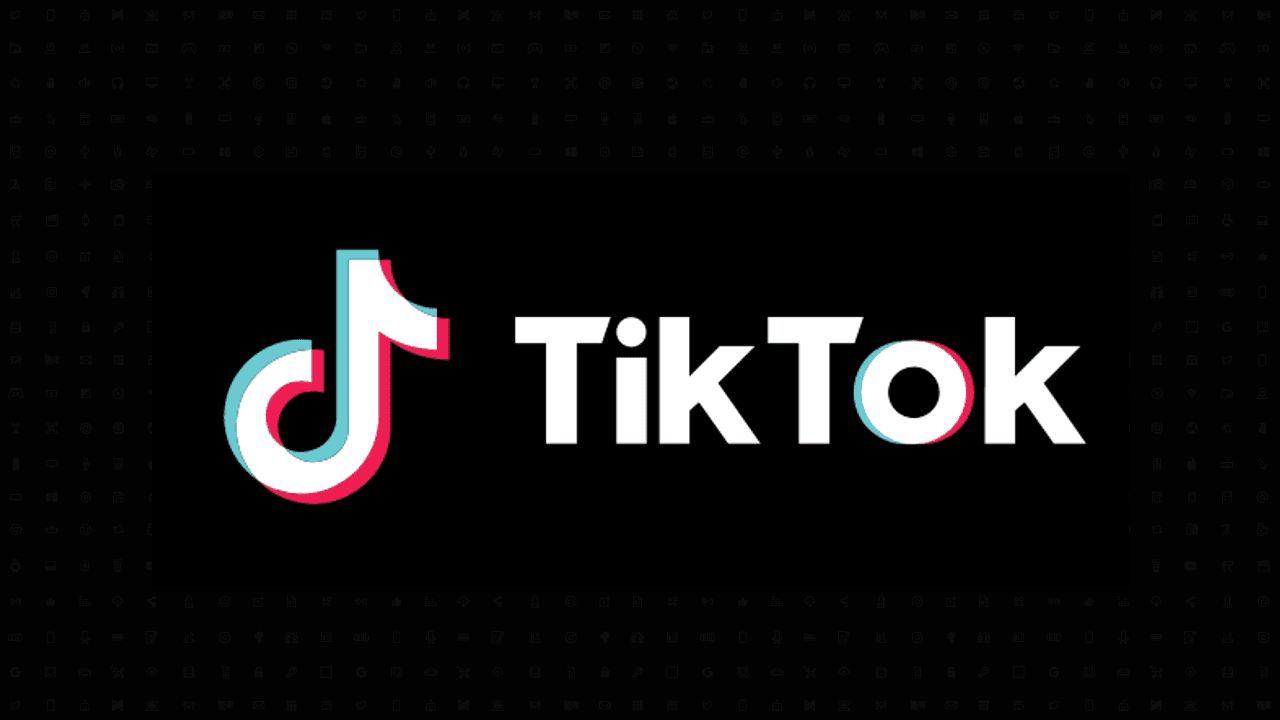
Any avid TikTok user wouldn’t pass up the opportunity to join the TikTok trend bandwagon. And who doesn’t? TikTok is one of the top platforms for Gen Zs and millennials. You could go from zero followers one day to a million views and followers the next day—provided your content is entertaining. Whether you’re new to TikTok or not, not lagging behind the best TikTok trends is easy. All you have to do is follow the top influencers and accounts. But don’t fret. We’ve done the searching for you. Here are 10 top TikTok trends you should try if you’re looking to achieve fame in a day or two!
1. Hairstyle transformation
Hair can transform a person into a whole new person just by changing the style, cut, volume, or color! TikTok users are using the platform to show off their new hairstyles—in a fun way! They show before-and-after images or clips, some with jaw-dropping transformations, and you won’t even know it’s the same person.
Watch this example.
2. Eco-friendly DIYs
Sustainability is a massive part of any content. Whether it’s a business or personal account, focusing on sustainability will get you more followers from like-minded users. Brands are also posting more videos that show sustainable processes and resources. However, if you’re just hugging trees and kissing flowers out here, you can create eco-friendly DIY projects on TikToks to make your clips more meaningful.
Here’s a video of an empty soda bottle turned into a mini fan!
3. Pet challenges
Pets are also a good way to capture the heartstrings of any user, young or old. Content is always meaningful when you include your loving furry companions. Pet challenges involve making your pets perform tricks from prompts, often with trending music. One of the newest pet TikTok trends is the “hands-in” challenge.
Here’s a hands-in challenge video.
4. Trending dances
TikTok’s trending dances never fail! These are always the first viral videos, especially with newly released sounds. These trends are also the simplest to follow if you don’t have two left feet. Some dance moves are easy, such as swaying your hips or moving your hands. Meanwhile, some are more complicated depending on the music. If you want to create a fun TikTok video, trending dances are a go-to!
Here’s the trending Tiramisu Cake dance.
5. Street interviews
Street interviews are also gaining more popularity on TikTok as these videos are fun, candid, and entertaining. Interviewers or content creators can stop anyone on the street and ask them random questions. These questions can vary from recent events and celebrity issues to fun, lighthearted questions. TikTok users enjoy watching these videos because knowing what people think about specific issues or topics is entertaining, especially when put on the spot.
Here’s an example.
6. Recipe remixes
If your TikTok content is about food, you shouldn’t miss recipe remixes. It refers to chefs or cooks cooking traditional dishes and putting their twist to make them interesting. This can also include adding new and unconventional cooking techniques to share something new with aspiring chefs. You can innovate a classic dish from your country or another country and see which process gains more kudos from followers.
This is a TikTok video of a dumpling mix turned into a taco.
7. 90s nostalgia
If you’re a 90s kid, any 90s-related TikTok content will surely make you smile. Bringing the 90s back on a modern platform is nothing new in social media. Creating content that takes you back to the 90s about music, dance crazes, fashion, toys, and trends connects with the right people. While this attracts people in the 90s era, content like this can also interest the new generations that have caught up with it or want to learn more about it. After all, everything in the 90s was way more interesting!
Here’s someone dancing to nostalgic 90s music.
8. A day-in-the-life content
A “day in the life” content is one of the top TikTok trends. This shows your followers what you do daily. Content creators offer their fanbase a peek into their lives, from waking up in the morning and going to work to cooking dinner and bedtime routines. Content like this is suitable for popular creators or influencers to gain more loyalty from their fans. Adding a personal touch to your content will make you seem like someone they can relate with and reach out to. Also, ensure you respond to your fans’ comments in a non-templated manner.
Here’s someone’s day-in-the-life vlog from waking up and going home after a day’s work.
9 Home organization
Home organization TikTok trends are for homeowners who like to keep things neat. These types of content are also informative and benefit followers, encouraging more users to follow your account. Whether it’s showing off your favorite home organization hacks or educating followers on how to create tidier spaces, these videos will impress users, provided they are high-quality.
Watch this example.
10. POVs
You can also create some funny POV (point-of-view) videos about anything. These videos entertain and help you connect with your users, mainly if you publish relatable circumstances. Being a real and genuine content creator is crucial, so you’re building that virtual rapport with your audience. POV videos also take serious situations and turn them into lighthearted jokes.
Here’s a funny POV video.
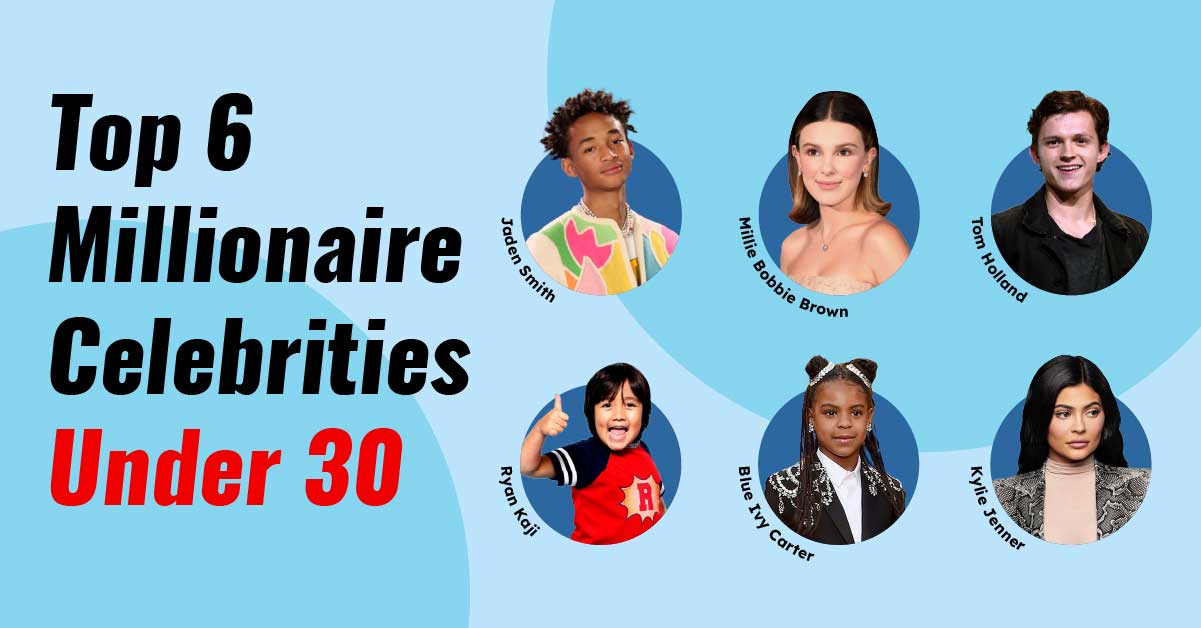
While some dream of striking it rich before the first gray hair sprouts on their heads, these celebrities are already there. Using brains, hustle, and a sprinkle of stardust, these financial titans are crushing it, and crushing it real good! Here are six millionaires under 30:
Jaden Smith (25 years old)
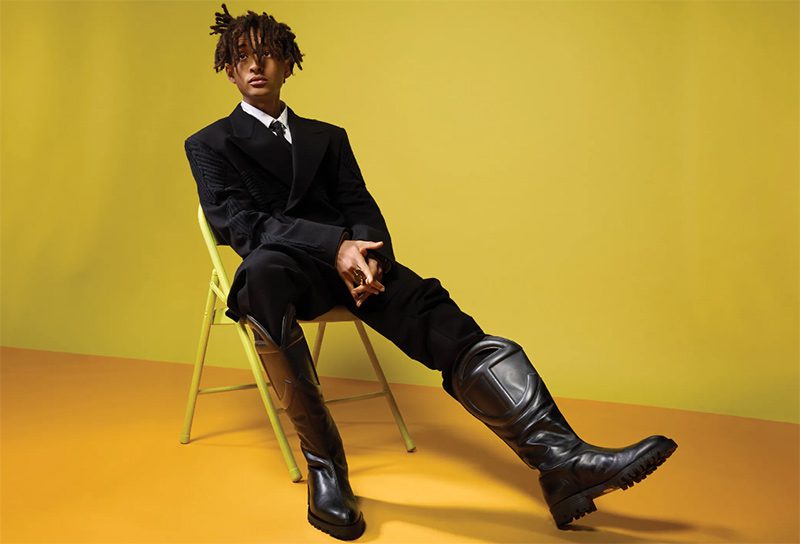
Image Source: FN
At 24, first on our list is Will Smith and Jada Pinkett Smith’s son, Jaden Smith. Playing around with his creativity in music, acting, and fashion while amassing a net worth of around $8 million. He built his empire starting with Justin Bieber’s song “Never Say Never,” which launched him into stardom.
Many dismiss this success as riding on his parents’ coattails; however, the hits kept coming, proof that the guy was carving his own path. Next, he conquered films with starring roles in The Karate Kid, After Earth, The Get Down, and many others. By this time, he has co-founded the fashion brand MsftsRep.
Millie Bobbie Brown (19 years old)
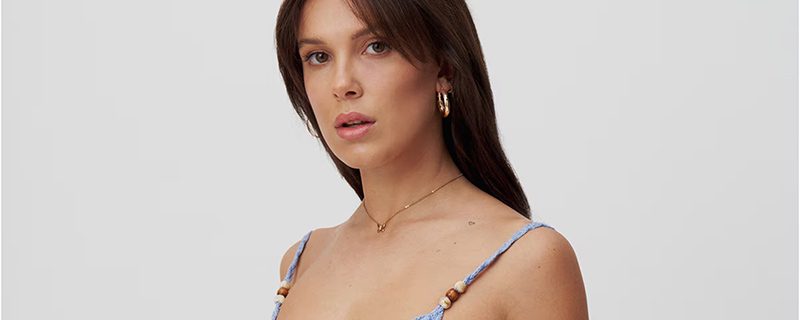
Image Source: Wallpapersden
Not just Eleven from Stranger Things, Millie Bobbie Brown has become a global phenomenon. While her fantastic portrayal of the innocent but powerful girl in the Netflix series was what catapulted her to fame, Millie is more than that. Slowly, she is building her empire with her brilliant acting, producing, and entrepreneurship skills, inspiring Gen Zs and millennials worldwide.
Millie Bobbie Brown’s net worth of around $20 million comes from her acting endeavors Godzilla: King of the Monsters and Enola Holmes, proving that she went far beyond the sleepy town of Hawkins. She also launched her cosmetics, Florence by Mills, a vegan and cruelty-free line for teens. Millie is also UNICEF’s Goodwill Ambassador, raising awareness for children’s rights and climate change.
Tom Holland (27 years old)

Image Source: Rock & Pop
You may know him as the friendly neighborhood Spiderman, but did you know Tom Holland is also the adorable kid flying through the air in Billy Elliot? And did you also know that his net worth is estimated at around $20.6 million? This comes from his roles in the Spiderman franchise as well as other acting stints.
Aside from his immense talent, his meteoric rise comes from several endeavors, the films Cherry, Chaos Walking, Uncharted, and many others. Beyond dancing and web-slinging, Tom also has a heart of gold. He is an advocate for mental health awareness and many other causes.
Ryan Kaji (12 years old)

Image Source: NWC
When they say to start them young, this YouTuber did as he was told. Ryan Kaji, at 12 years old, is one of the world’s most popular content creators on the platform. He has more than 34 million subscribers and over 54 billion views, a feat many older people only dream of. He does this by reviewing toys, doing science experiments, and going on adventures.
With an estimated net worth of $32 million, Ryan has already branched out to a variety of ventures, such as a toy line, clothing line, and a TV series. His infectious energy, winning personality, and strong social media presence all contributed to his inspiring success.
Blue Ivy Carter (12 years old)
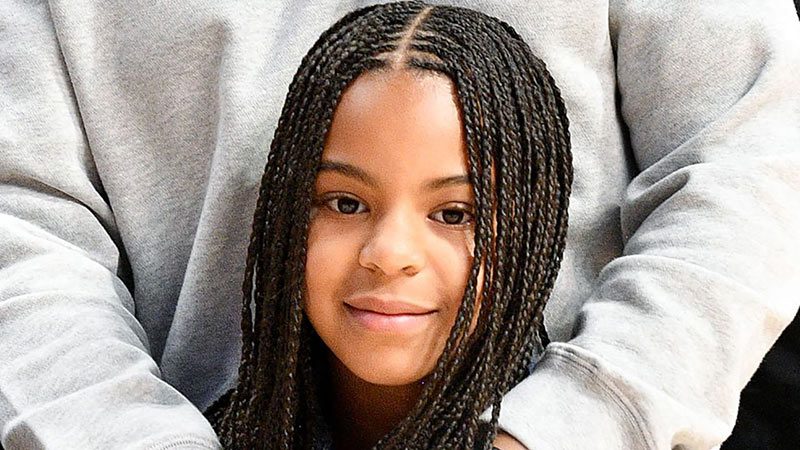
Image Source: CNN
An heiress to her parents’ humongous empire in the world of music, fashion, and cultural influence, Blue Ivy Carter is slowly but surely carving a solid path that’s uniquely her own. With an estimated net worth of around $800 million, Blue Ivy is also racking up a list of achievements. She is the second-youngest person to ever win a Grammy for her and her mother’s music video for the hit “Brown Skin Girl.”
Not only did she appear in the video, she also co-wrote the song, showcasing her talent in songwriting. She also has her own fashion line called Ivy Park Kids, following her mother’s footsteps in Ivy Park. This shows that Blue Ivy isn’t just her parents’ daughter but a talented young thing ready to take on the music and fashion world.
Kylie Jenner (26 years old)
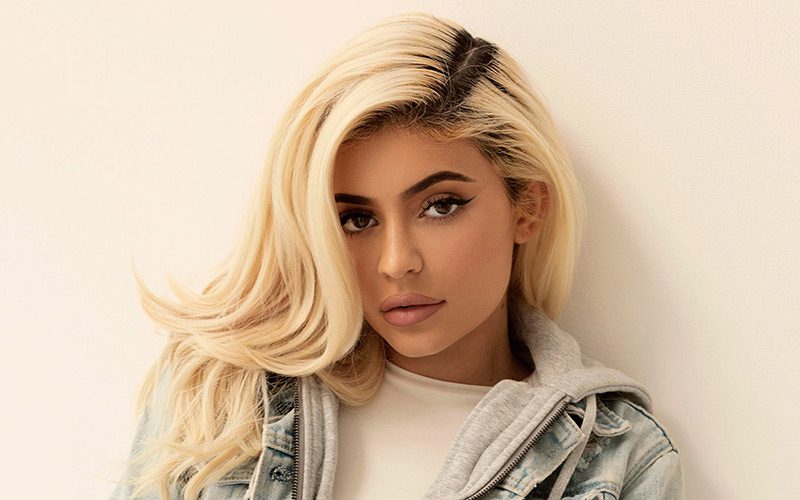
Image Source: HDQWalls
The youngest of the Kardashian-Jenner family, Kylie Jenner went beyond TV fame and stepped out of her sisters’ shadows by becoming a self-made billionaire. Yes, you read that right: Kylie’s net worth is estimated at around $1 billion. Despite controversies, she successfully built her cosmetics brand and influenced millions with her every move.
Kylie launched Kylie Cosmetics by Kylie Jenner, Kylie Skin, and Kylie Baby in 2015, and by 2019, she sold a majority stake to beauty giant Coty for a whopping $600 million. This solidifies her status as a beauty mogul, young billionaire, and social media superstar.
Entertainment
Top Free AI Music Generators for Aspiring Artists
Published
1 year agoon
August 3, 2023By
Carmen Day
For aspiring artists, Artificial Intelligence (AI) music generators have emerged as invaluable tools to spark innovation. That said, an AI music generator free of charge offers an incredible tool for limitless musical possibilities without costing a penny.
This article explores the top free AI music generators that promise to unleash your artistic potential. Whether you’re a budding songwriter, a curious producer, or an experimental musician, each AI music generator online platform on this list offers an inspiring blend of technology and artistry to fuel your creative journey.
1. Soundful
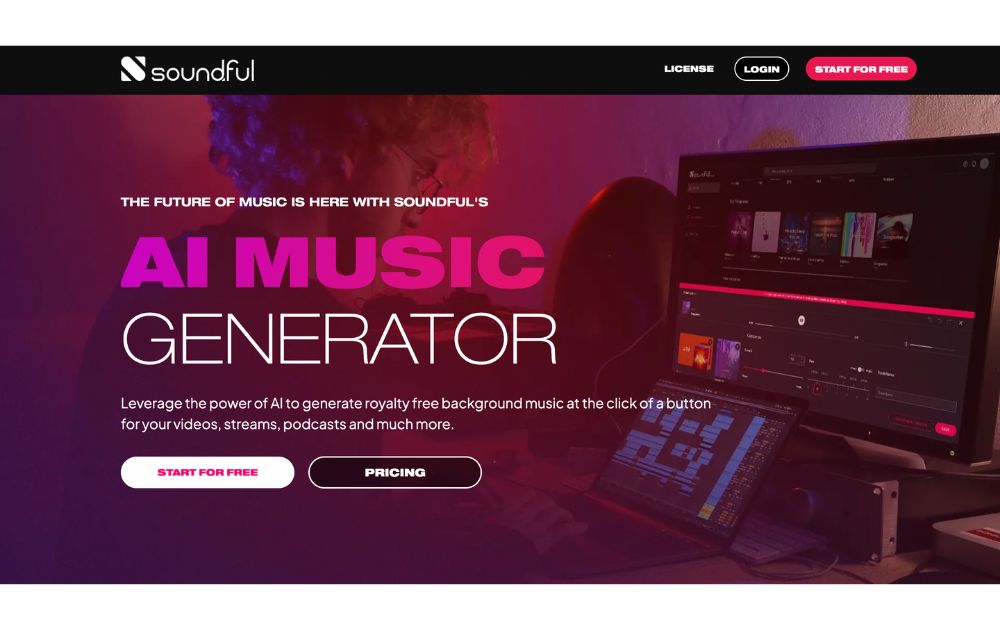
First on our list of AI music generator free tools is Soundful. This AI-powered platform creates royalty-free background music for videos, streams, podcasts, and more. Users can easily choose a genre, customize inputs, and generate tracks until they find the perfect match. The music is unique and won’t replicate existing songs or tracks from the platform itself, as the algorithms are trained note-by-note with the help of industry producers and sound engineers.
This AI music generator has a free forever plan, with ten monthly downloads and access to over 25 deadlines. The plan is designed for personal use and non-profits.
2. Amper Music
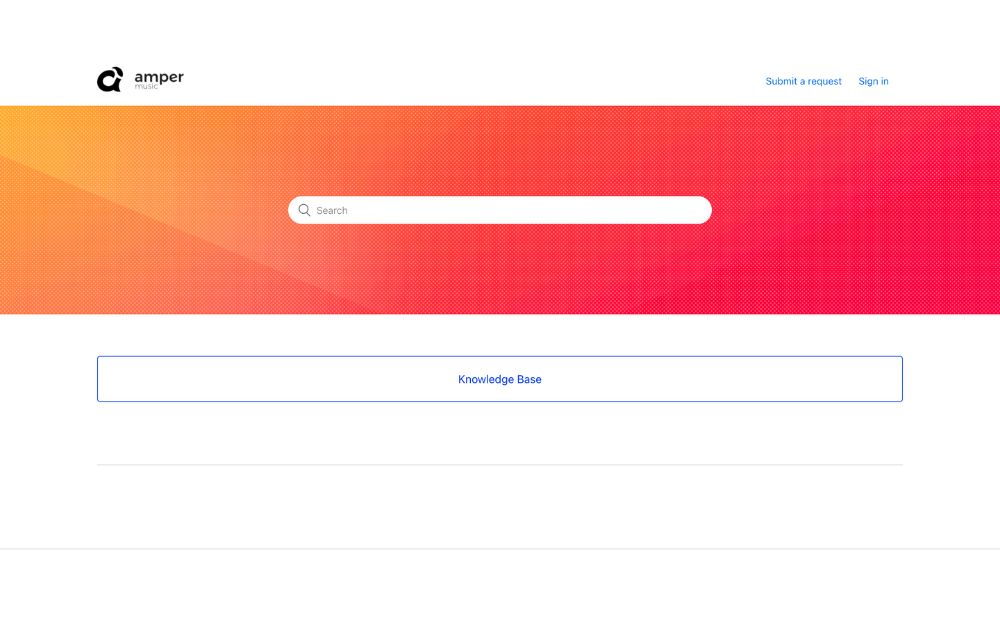
Amper Music is known for its user-friendly interface, making it ideal for beginners in AI-generated music. It doesn’t require extensive knowledge of music theory or composition as it uses pre-recorded samples to create musical tracks. These tracks can be modified with different music keys, tempos, individual instruments, and more, allowing users to tailor the music to their desired mood or vibe.
This platform offers an AI music generator free account, but you’ll need to pay track licenses to download and use the music.
3. Mubert
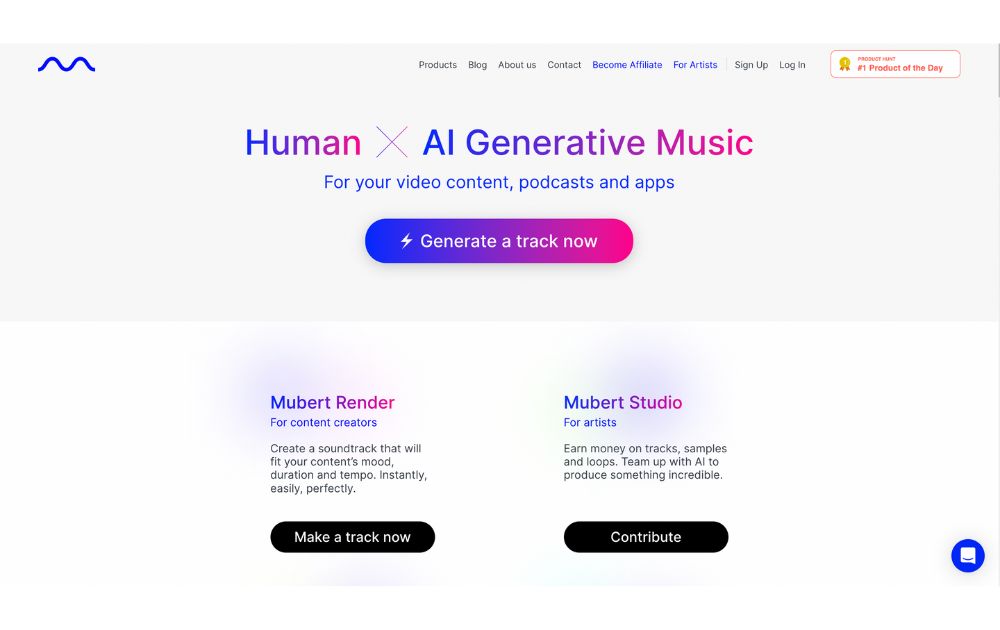
Mubert is an advanced AI music generator that stands out in the industry due to its blend of technology and creativity. It offers a unique approach to music production, enabling users to break traditional boundaries and generate custom soundscapes. The platform provides several advantages, including an API for creating personalized music experiences in apps and games. It also has a marketplace where users can sell AI-generated tracks.
This AI music creator offers a free Ambassador Plan for personal projects without monetization and ad spend.
4. Aiva
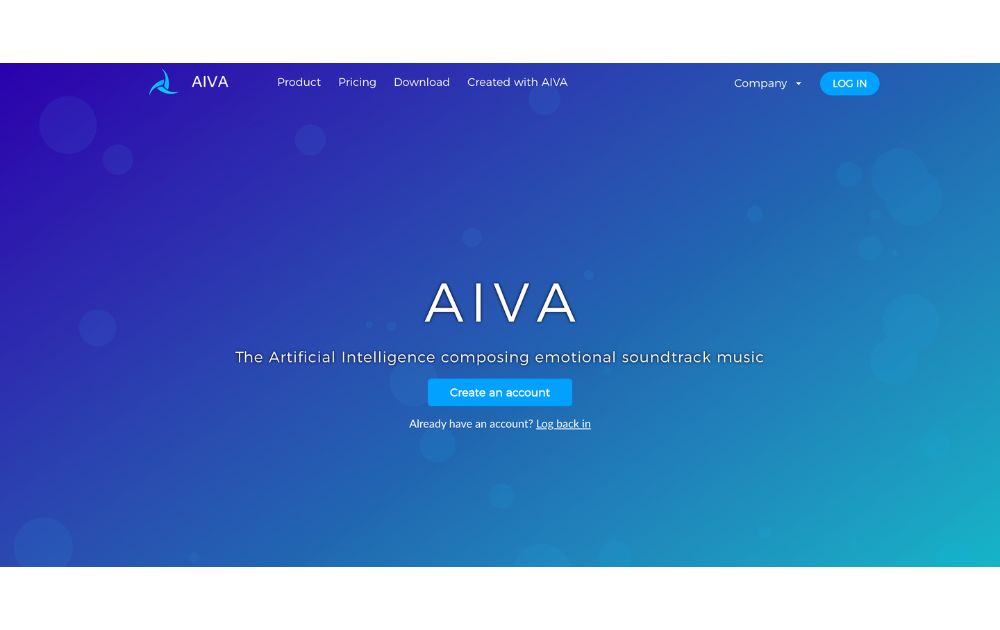
Aiva, an AI music generator established in 2016, specializes in composing soundtracks for diverse media like ads, video games, and movies. Its tool allows users to create original music or produce variations of existing songs, bypassing the complexities of music licensing. The platform offers a wide range of presets, specific music formats, and the flexibility to edit soundtracks, making it a favored choice among professionals and amateurs.
Key features of Aiva include a variety of presets and music formats. It offers a functional free version with limited features and the ability to edit and modify existing tracks. Users can select a template, key signatures, music length, and the number of AI-generated compositions.
5. Soundraw

Soundraw is another excellent AI music generator that offers various features, including the customization of songs with AI-created phrases. The tool utilizes a combination of AI and manual tools to make music effortless.
The platform is easy to use, making it accessible for beginners and experienced musicians. It’s also compatible with Google Chrome and Premiere Pro, making for seamless integration. There’s a free plan for users who want to create music, but you’ll need to subscribe for unlimited downloads.
6. Beatbot
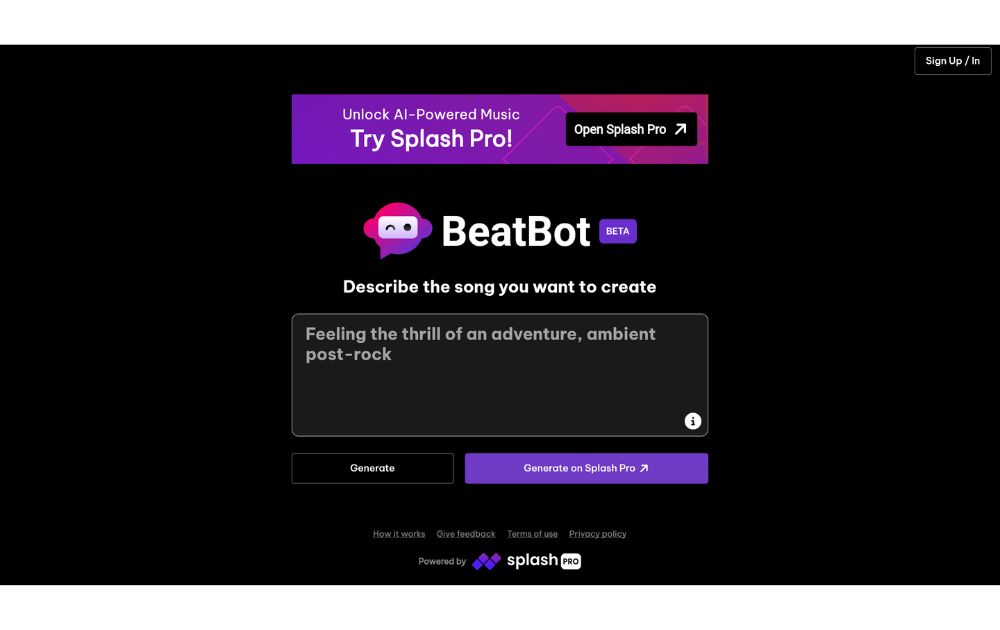
Beatbot is an innovative AI music generator with vocals that composes short songs based on user-provided text prompts. It uses Splash sound loops for music and vocals while ChatGPT writes the lyrics. Currently in its Beta phase, Beatbot is free to use, but pricing may be introduced in the future.
You can use the platform to experiment with different prompts and lyrics. And if you’re not fully satisfied with the result, you can click “Retry” to regenerate the music. Beatbot is free to use.
7. Boomy
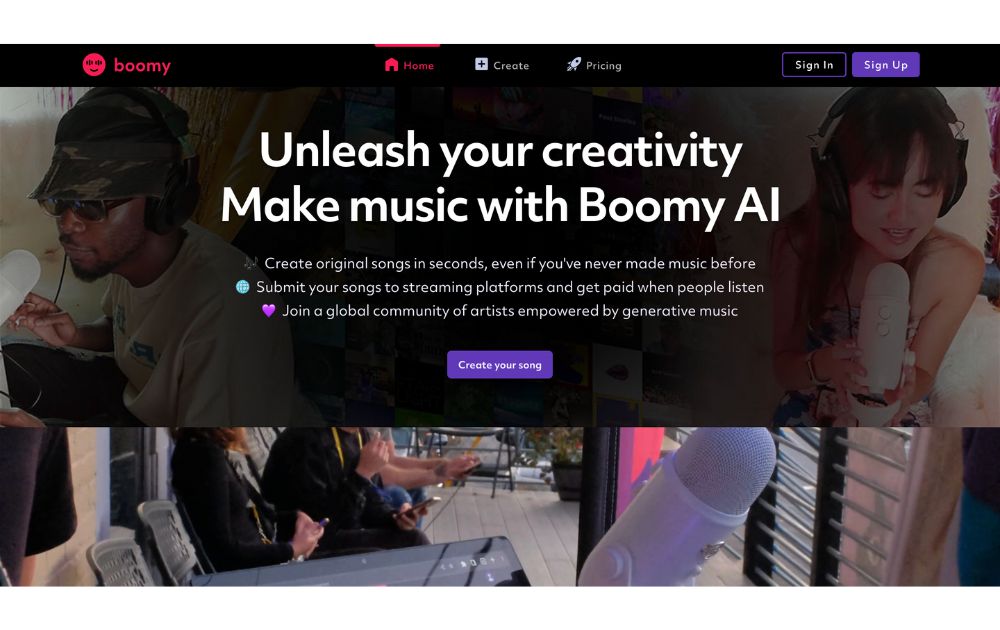
Some users name Boomy as the best AI music generator that simplifies music production. It allows users to create original songs within seconds and provides the opportunity to submit these songs for potential streaming revenues from various services, making it a highly distinctive platform.
The platform offers both free and subscription versions. You can create and edit songs with the free plan and save up to 25 songs. However, you’ll need a paid plan to download songs and use them for non-commercial or commercial use.
8. Loudly
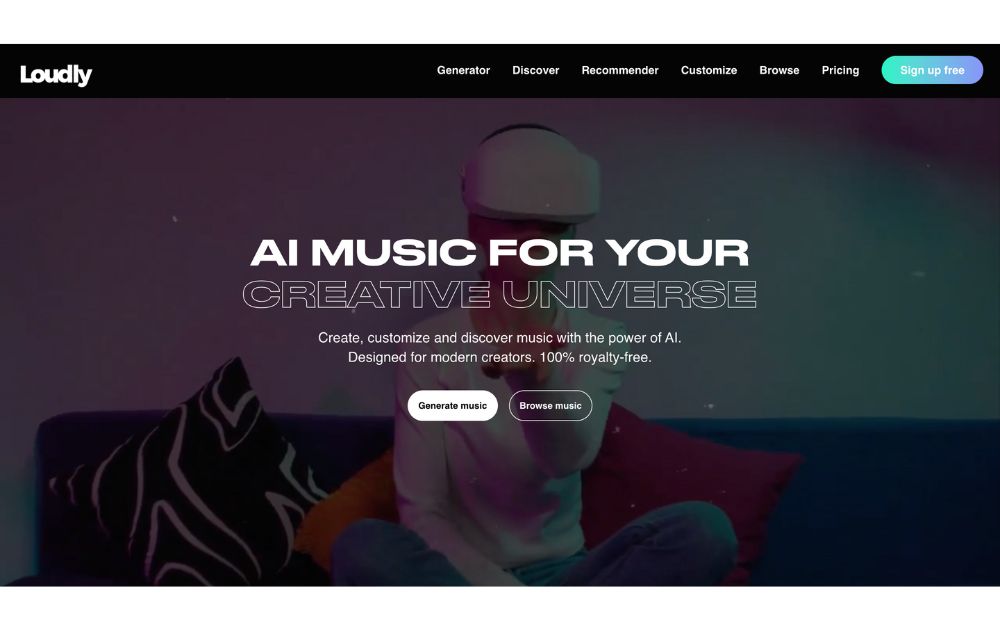
Loudly is an AI-powered music tool with a vast library of over 170,000 curated audio loops. Its advanced playback engine combines and warps loops while following chord progressions in real-time, ensuring musically meaningful compositions. Loudly’s unique approach combines expert systems and generative adversarial networks, supported by collaboration between their music team and machine learning experts.
Loudly offers multiple subscription plans, including a free one, making it a viable option for those looking for a free music generator.
9. Beatoven
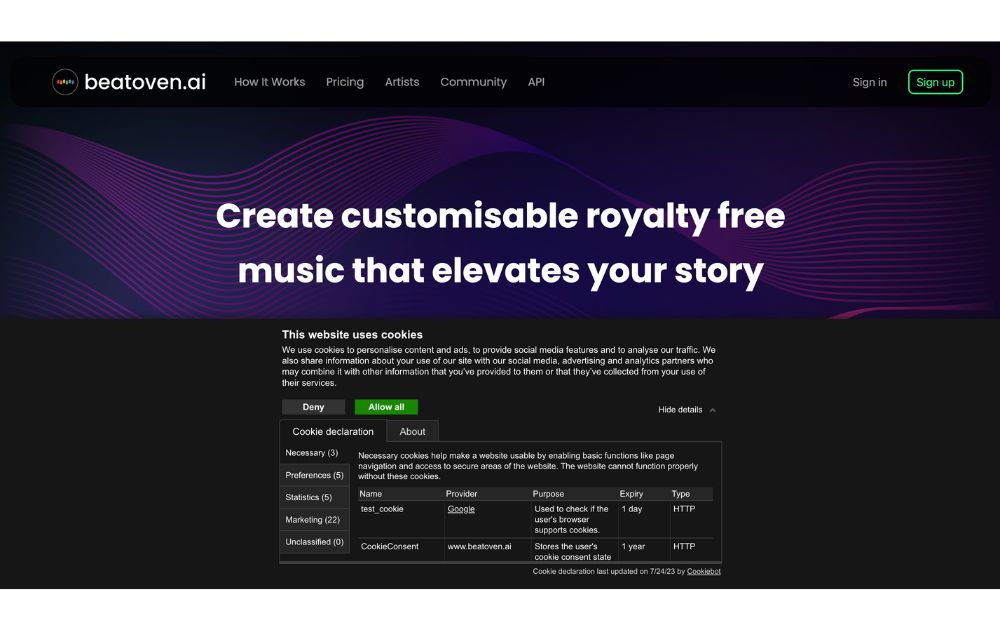
Beatoven is specifically designed to compose original soundtracks for videos or podcasts effortlessly. Without music theory expertise or production experience, users can create unique, mood-based music, ensuring an enjoyable and inclusive creation process.
This AI music generator is ideal for content creators seeking unique, mood-based music for their videos or podcasts. It is also a valuable tool for individuals interested in music creation but lack technical knowledge or resources.
There’s a free plan for individuals wanting to start with the platform. This plan comes with five minutes of free monthly downloads and access to features like instrument selection and volume dynamics.
10. MuseNet

OpenAI’s MuseNet can produce songs with up to ten instruments in 15 different styles. A unique feature of MuseNet is its ability to mimic famous composers like Mozart and contemporary artists like The Beatles. The tool relies on a deep neural network trained on internet data, enabling it to evaluate music over extended periods.
While MuseNet offers numerous music samples on Soundcloud, it currently does not allow users to generate their own music using the tool.
You can use the AI music generator free of charge from their website.

8 Popular Mobile Payment Systems

Omnichannel Marketing Platforms: Definition, Examples & Tools

10 Camping Tech Tools for a Fun Adventure

10 Adventure Travel Destinations You Don’t Want to Miss

10 Sustainable Outdoor Gear Brands

10 Sustainable Activewear Brands


Patti Fitzgerald Hartley
November 16, 2022 at 7:45 pm
I think the MeToo movement is a bunch of hypocrites. You heard the tapes Amber heard was definitely the aggressor she said so many times that she hit